
The multidimensional nature of cultural heritage makes it an essential tool in the hands of Iraq’s political and religious actors to advise their political and social agendas. Cultural heritage, as the country’s second-biggest source of revenue after oil production, has been heavily manipulated for the private gains of the powerful, diminishing its immense value as a public good equally accessible to all. Iraq’s heritage misuse objectives range from commercializing cultural resources to propagating sectarianism and appropriating culture to serve political and religious purposes. Since 2003, conflict, the establishment of the political power-sharing system of muhasasa, and the elite exploitation of heritage have caused significant damage to Iraq’s history and culture.
Through the years, cultural heritage in Iraq transformed from a symbol of nationhood into a political tool. Saddam Hussein, during the years of his presidency, following Mussolini’s practice, set cultural heritage in the frontline of his government apparatus. In fact, after Hussein came to power, the budget for the Department of Antiquities was reportedly increased up to 80%. However, the years following the Golf war introduce a totally different reality. The Iraqi cultural heritage experienced unprecedented looting activity by organized groups and criminals, flooding the international market with illegal Iraqi antiquates. Additionally, the international sanctions imposed against Iraq from the early 1990s until 2003 plunged the country into an economic depression, resulting in poor state funding for the preservation and promotion of cultural heritage. During the same period, the looting of archaeological sites and the illicit trade of cultural goods became a lucrative business.
How negligence, conflicts, the US occupation, and ISIS have affected the Iraqi cultural heritage has been thoroughly examined and discussed, but what about the politicization of cultural heritage? After 2003 the exploitation of heritage by Iraqi political elites as a political and economic resource became a practice. Muhasasa, the quota-based political system which assigns governmental positions to the various ethno-sectarian groups in Iraq, not only divided the power between Kurdish, Shia, and Sunni but also crushed the hopes for the promotion of national identity. Each ethno-sectarian group aiming to promote its political and economic interests has used cultural heritage as a weapon in its arsenal. The management of the Iraqi cultural heritage rather than assigned to the state has been transferred to autonomous institutions managed by political elites, who have instrumentalized the heritage to promote their ethnic and religious interests and shape the country’s political future.
In contrast to what is happening in practice, under national and international law, the protection of cultural heritage, as a state asset is both a right and an obligation of the state. Besides peacetime, since Iraq has ratified the 1954 Hague Convention for the Protection of Cultural Property in the Event of Armed Conflict and the 1972 Convention Concerning the Protection of the World Cultural and Natural Heritage the Iraqi government is obliged to protect the countries’ cultural heritage during times of conflict as well. On a national level, the Iraqi Antiquities and Heritage Law (No. 55, 2002) provides that the protection, conservation, and management of the Iraqi heritage is the responsibility of the Iraqi State Board of Antiquities and Heritage (SBAH), a sub-directorate within the Ministry of Culture, Tourism, and Antiquities.
The protection and continuation of the Iraqi cultural heritage can be succeeded only if the power return to the Iraqi State. Of course, international support, through funding, the development of partnerships, and other support mechanisms, is necessary for Iraq’s cultural recovery, but the state has to set the development of a cultural heritage strategy as a priority. Central to this effort should be the establishment of state institutions in charge of managing the national heritage and strengthening the existing legal framework.
By The European Institute for International Law and International Relations.












